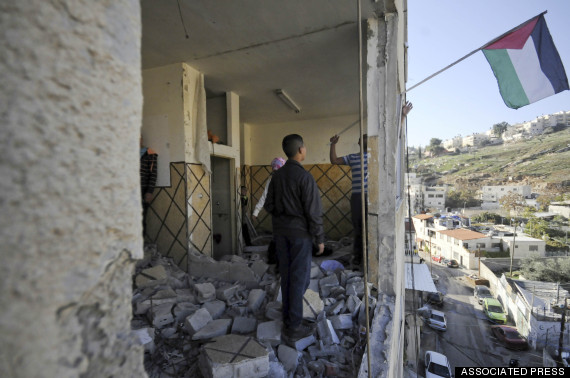Every week, we bring you one overlooked aspect of the stories that made news in recent days. You noticed the media forgot all about another story's basic facts? Tweet @TheWorldPost or let us know on our Facebook page.
Early Wednesday morning, Israeli forces blew up the family home of Abdel-Rahman Shaloudi, a 21-year-old Palestinian from East Jerusalem who killed three people on Oct. 22 when he rammed his car into a Jerusalem tram stop.
Shaloudi was shot and killed by security forces that day as he tried to flee the scene of the attack. This week, the destruction of the apartment where he had lived -- and where his family continued to live after his death -- signals Israel's return to the controversial policy of demolishing homes as retribution for lethal attacks on Israeli civilians.
The destruction of Shaloudi's family home came just one day after an attack by two Palestinian cousins on a Jerusalem synagogue, which left four Jewish worshippers and an Israeli policeman dead. Both Palestinian attackers were killed in a shootout with police. In the wake of that attack, Israeli Prime Minister Benjamin Netanyahu ordered the two Palestinians' homes to be destroyed as well.
 Palestinians hang a national flag inside the demolished apartment of Abdel-Rahman Shaloudi in East Jerusalem on Wednesday, Nov. 19, 2014. (AP Photo/Mahmoud Illean)
Palestinians hang a national flag inside the demolished apartment of Abdel-Rahman Shaloudi in East Jerusalem on Wednesday, Nov. 19, 2014. (AP Photo/Mahmoud Illean)
Since the Arab-Israeli war of 1967, Israel has destroyed or sealed hundreds of Palestinian homes in Gaza and the West Bank in response to Palestinian attacks. The Israeli human rights group B'Tselem says on its website that the bulldozers target the homes of Palestinians suspected of having carried out lethal attacks against Israeli civilians and soldiers. In some cases, they have also targeted the homes of Palestinians believed to be planning such acts.
Since the attackers in a majority of these cases are already dead, on the run or held by Israeli authorities, the policy is chiefly meant to work as a deterrent. Israeli authorities hope that by visiting consequences on the family members of an attacker as well as on the attacker him- or herself, it will dissuade others from carrying out similar acts of violence -- or at least convince the relatives of would-be assailants to speak out before an attack takes place.
The residents of the homes do usually receive notice of the impending demolition. Shaloudi's family was notified last Friday that their apartment was scheduled to be destroyed, and by Wednesday they had vacated the premises.
This is how Asher Schechter describes the process in the Israeli newspaper Haaretz:
The Shin-Bet passes intelligence reports to the IDF and the government that establish the connection of a specific assailant to an attack that led to the death of Israeli citizens. Once a decision, usually by the government, has been made, Israel’s attorney general has to approve. If a green light is given, the family will be given notice. The owners will have 48 hours to appeal the decision to the regional command of the IDF. If and when their appeal is denied, they have 48 more hours to take their appeal to Israel’s Supreme Court. The Supreme Court, usually, stays out of the way.
Demolitions in the wake of attacks have happened with varying frequency in the decades since 1967, depending on the security situation and political atmosphere of the day. The Israeli government ended the policy in 2005 after a military review committee issued a report that questioned the efficacy of the program as a deterrent and argued that it aroused hatred among Palestinians.
Since then, Israel has refrained from carrying out punitive demolitions, although it's continued to destroy Palestinian houses that lack building permits and houses that it says it needs to clear for security reasons. According to B'Tselem, up until this summer, the only exception to the moratorium was the 2009 demolition of the home of Hussam Taysir Duwait, a Palestinian from East Jerusalem who had killed three people with a bulldozer the year before.
This August, however, the homes of two suspects in the kidnapping and murder of three Israeli teenagers were destroyed, and the home of a third suspect was sealed. This week's demolition and destruction notices signal the return of the policy in earnest. During a security cabinet meeting in the wake of Tuesday's killings, Netanyahu ordered the full reinstatement of the policy.
Responding to objections by five European nations, Israel's foreign ministry spokesman Emmanuel Nahshon argued on Friday that the measure was consistent with Israeli law and would be pursued.
"This is not meant to be punitive, but rather to dissuade others from carrying out terrorist attacks," Nahshon said, according to Reuters.
Haaretz reports that several officials in Israel's Shin Bet security service as well as the army have expressed support for the policy in recent months. The Times of Israel notes that shortly after Shaloudi's attack in October, Jerusalem Mayor Nir Barkat argued that "there is no other way, unfortunately."
The U.S. State Department said on Thursday that it considers punitive home demolitions “counterproductive in an already tense situation." A spokesperson for the department added, “This is a practice I would remind that the Israeli Government itself discontinued in the past, recognizing its effects.”
